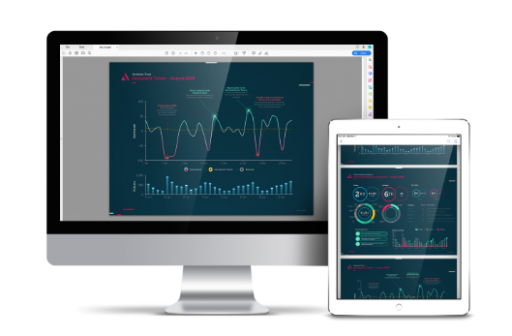Why should you implement a board intelligence platform in your business?
Why should you implement a board intelligence platform in your business?
In recent years companies have had to adapt to keep pace with the rapidity of technological advancement. The latest challenge facing business leaders is data volume. With 97 zettabytes of data created, captured and consumed by the end of last year, there is a wealth of potential intelligence available to them. Knowing what to do with and how to make sense of it is the hard part.
This is where business intelligence comes in.
While typically companies must wait for annual reports to be released before assessing the growth of the business, intelligence solutions offer more accurate and real-time data for analysis than manual solutions, thus giving the company a huge advantage over competitors.
Never has the importance of business intelligence been demonstrated more clearly than during the coronavirus pandemic. As of early 2020, company boards across the globe were abruptly forced to switch to digital formats, which included distributing digital board materials in a secure way.
For some this process involved a compilation of different platforms and technologies. For others, this adaptation was facilitated by adept board management software and purpose-built intelligence platforms, often leading to greater success. This is because board intelligence platforms enable better and more informed decision-making by improving the content and structure of board information.
In the past, companies succeeded primarily by delivering financial performance – it was all about the shareholders. However, this is no longer the case. Nowadays, successful business leaders must not only deliver for shareholders, but other stakeholder groups as well.
The growing importance of stakeholders
How does a business go about this? It goes without saying that boards are time-poor and therefore discussions around stakeholder-specific metrics are often reduced to a yearly discussion, if that. Owing to the rapidity with which sentiment changes, this is clearly insufficient.
Stakeholder governance – i.e., engaging with the impact that certain issues will have on stakeholders and then incorporating it in decision making – is often a contentious subject, with arguments made both for and against it. When done well, stakeholder governance ensures a business’ long-term success. Done badly, it can cause extensive reputational damage.
To avoid the latter, it is the job of both support teams and leadership teams – but most critically the board – to maintain consistent and clear messaging with stakeholders before making any large-scale decisions.
Learning to predict the unpredictable
In order to ensure the effectiveness of this process, boards and leadership should be frequently asking themselves critical questions from the position of the stakeholders such as which stakeholder groups would be impacted by certain actions the company takes, which groups are essential to the company’s long-term success, and how often should key groups be reassessed?
As well as this, it is the job of the board to consider which form(s) of engagement are most suitable for the stakeholders themselves, not just the company, and ensure they are implemented. Another simple way in which boards can fulfil or maintain their claim of stakeholder governance is by ensuring that all board papers and key information address the above questions. That way every member of the board has sight of the company’s aims and it avoids any potential miscommunication.
Quality and quantity – making the most of the data
All this is much easier said than put into practice. Leadership teams and board members can only make decisions based on the data they are given and if a company fails to engage with its stakeholders – or engage with them often enough – this data is limited at best. Poor data leads to inaccurate metrics and a reduced ability to predict and manage future risks. Companies must therefore re-examine how information is presented to the board and look to intelligent board portals to understand their reputation and performance.
The trend towards online
Of course, moving boards online can be a daunting task and understandably is often approached with apprehension – especially when it involves sending and receiving potentially confidential and sensitive materials like board packs. Luckily, there’s a solution for that, which comes in the form of ISO certification.
By opting for a board intelligence portal that is ISO 27001 certified, which is the leading international standard for information security and is approved for hosting UK government data, you can rest assured your data is in safe hands. Not only this, ISO also provides a host of other benefits including giving you an advantage over competitors who are not using it, as well as preventing security incidences and thereby lowering costs, all of which are great reasons to get on board.
Conclusion
By utilising real-time data in the form of intelligence portals, company boards are able to compare themselves with others to evaluate how they benchmark on issues such as decision making, diversity and inclusion, and ESG, as well as allowing them to respond to and predict future issues. This is applicable to boards across all sectors. Now, more than ever, is the time to depart with inefficient processes and implement board intelligence in order to better prepare for the future.
Companies wanting to leverage intelligence so that their business performs more efficiently must look to their boards first and foremost. Making use of a board intelligence platform allows a company to directly connect corporate behaviours to reputation scores, allowing organisations to track and mitigate the impact of reputation on business performance.
alva is pleased to share that we are now Penta Group, the world’s first comprehensive stakeholders’ solution firm. Stay in touch with us by following us on LinkedIn and on Twitter @pentagrp.
Be part of the
Stakeholder Intelligence community









